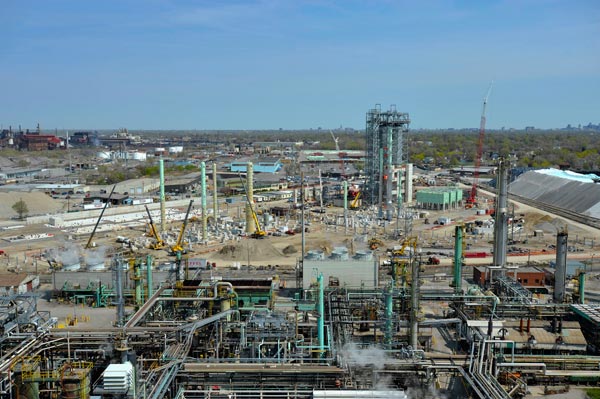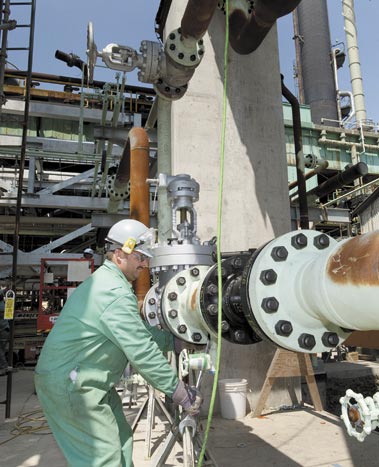Fuel flexibility key to massive upgrade at Marathon refinery
Date Posted: July 23 2010
DETROIT – Marathon Petroleum Company LLC’s refinery is in the midst of a $2.2 billion project that will allow it to process heavy crude oils, like those from Canada, and help keep Michigan’s only petroleum refinery viable and flexible well into the future.
Slated for completion in 2012, Marathon’s Detroit Heavy Oil Upgrade Project (DHOUP, as the company calls it) involves the installation of new processing equipment that will increase the refinery’s capacity to 115,000 barrels per day, up from 106,000 bpd. Marathon will also add 60 full-time employees and 75 full-time contractors.
Project engineering and construction are being managed by Fluor Corp. Approximately 600 building trades workers are at the construction site currently. “In a word, they’ve been outstanding,” said Marathon Construction Manager Dan Barrett. “The quality of work is good, safety is exceptional, and the trades recognize this as one of the few major projects in the area, and they’re very supportive of what we’re doing out here.” Manpower on the job will ramp up to an average of 900 Hardhats a day during the peak construction period next summer.
Work began on DHOUP in June 2008. The project was on more of a fast-track basis until petroleum product demand slowed along with the economy, prompting Marathon to extend the project’s timeline.
There’s much to do in this project, and not a lot of room to do it in. The southwest Detroit facility is one of Marathon’s smallest, and is its only refinery in an urban area. Bisected by railroad tracks, Marathon’s more than 200-acre grounds are wedged into a site bordered by I-75, a salt mining company, and various active surface streets. Acres of open lots nearby have been purchased or leased by Marathon for use as lay-down areas during construction.
A refinery has been on the site since 1930; Marathon purchased the former Aurora Gasoline Company in 1959 from the late Detroit philanthropist Max Fisher.
Probably the project’s biggest day-to-day challenge, Fluor Project Manager Jack Penley said, “is the sheer logistics of the project. Lay-down yards and offices and parking are scattered all over. There’s a constant stream of construction workers and supplies moving through here daily. And yet, we’re on top of things and staying ahead of our plan.”
Barrett said it’s a challenge managing the state’s largest construction project in a refinery setting that operates 24/7. “When you bring in heavier crude, there are places where the pipes need to be bigger,” he said. “It’s kind of like an angioplasty.” Some 500,000 feet of additional above-ground pipe will be installed at the refinery when the project is complete.
Among the myriad other tasks on Marathon’s to-do list is the installation of a new sulfur recovery/removal unit, since there’s a significant amount of sulfur in the Canadian crude oil. On the clean-air side, the trades will also install ultra low-NOX (nitrogen oxide) burners and a selective catalytic reduction system to control NOX, as well as a distillate hydrotreater to greatly reduce sulfur in refined products.
Easily the project’s biggest milestone to date was the setting of a pair of massive 120-foot-long “coker drums” on the site in November 2008. Built in Spain, then floated across the Atlantic Ocean to a Rouge River dock, then carted overland to the Marathon site on a multiple-axle flatbed trailer, the coker drums dominate the landscape on the refinery’s Oakwood Boulevard site.
Part of the refinery’s “delayed coker” processing system, the drums will convert asphalt-like material into liquid petroleum fuel blend components and petroleum coke (a coal-like substance). It also will allow the refinery to thermally convert and upgrade heavy crude oil into higher quality products such as gasoline, diesel, and petroleum coke.
“Fluor has done a lot of coker projects, but it was an incredible feat for these to go up so quickly,” said Penley. “Nineteen weeks from driving piling to setting the two coke drums. This has to be an industry record.” Penley attributed this, in part, to several innovative technologies that were used.
Penley and Barrett said overall, the project involves little in the way of groundbreaking refinery technology. The pipes, valves and systems installed during the on this project “are all pretty conventional technologies,” Barrett said. “This project is all about relying on a high-quality workforce to perform good, safe work, day in and day out.”
Constructing in close proximity to a working refinery, safety is a major part of every construction process. With 1.5 million construction man-hours worked on the project, only a minor finger wound to a worker is on the injury side of the ledger.
“Marathon and Fluor aren’t just paying lip service to safety, they’re as safety conscious as I’ve ever seen,” said Ed Coffey, retired business representative with the Michigan Building and Construction Trades Council who still consults on the project. “They’re very strict, but our people have to take heed that they’re working in a refinery, and that one accident could be catastrophic. Marathon and Fluor have been great about making safety a priority.”
More than four million man-hours will be worked when the DHOUP project is complete. The project will involve the driving of 7,700 piles, and placement of 50,000 cubic yards of concrete and 15 million pounds of steel.
“When we finish this project in 2012 we’re going to have a refinery that’s more flexible than before, because we’ll be able to run a wider assortment of crude oils,” Barrett said. “We will also see some efficiency gains. “But we have lot of work to do before we are finished, and we are counting on the building trades to continue to focus on safety as they go about their jobs every day.”

A SET OF 120-FOOT TALL “coker drums” rise in the distance at Marathon Petroleum Co.’s Detroit refinery. The building trades are performing $2.2 billion in upgrades to the plant.

TIGHTENING BOLTS on a 600-lb. gate valve in Marathon’s Naptha Hydratreater Unit is Matt Carden of Pipe Fitters Local 636, working for John E. Green. Photos by Peter Rethorn/Marathon Petroleum LLC
